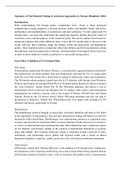Summary of The Domestic Setting of American Approaches to Europe (Hamilton, 2016)
Introduction
With understanding US foreign policy complexities arise, which is often portrayed
simplistically as being shaped by a division between realists and idealists, hawks and doves,
unilateralists and multilateralists or isolationists and interventionists. To truly understand US
foreign policy, one must also understand the underlying domestic debates about the nature of
American society and the purpose of the American polity. The article outlines four historical-
ideational traditions that reflect different ideas of how the US should relate to the rest of the
world, and how these traditions shape the debates within the Democratic and Republican
parties. These traditions help to explain the often-bitter debates and the broad domestic setting
that influence American approaches to Europe. National leaders need support from at least two
or three of these traditions to build a coalition for a successful foreign policy.
Four Policy Traditions of US Foreign Policy
Wilsonians
Wilsonianism, named after Woodrow Wilson, is a foreign policy approach based on the beliefs
that democracies are better partners than non-democracies and that the US is a nation apart
from the rest of the world with a moral duty to spread its democratic values and institutions.
The Wilsonian tradition played a significant role in US relations with Europe, from Woodrow
Wilson's justification for entering World War I to Franklin Delano Roosevelt's efforts to protect
the "four freedoms" during World War II. The Wilsonian approach also played a role in
international efforts to prevent war through codes of conduct, arms control, and international
organizations for collective security, such as the League of Nations, World Court, and United
Nations. However, the US doesn't always follow Wilsonian principles and this can lead to
perceptions of hypocrisy. Despite this, Wilsonianism has won support and sympathy for US
influence and power, particularly in Europe
Hamiltonians
The Hamiltonian school of thought is named after Alexander Hamilton and refers to the belief
in the importance of maintaining a free and open international trading and financial system for
the benefit of the United States. Hamiltonians view international commerce as a potential cause
of peace and advocate for American efforts to ensure freedom of trade and access to resources,
as well as an international legal and financial order. This tradition has had a significant impact
on US relations with Europe, leading to the creation of international institutions to promote
peace and stability. The resulting American system is organized around a network of rules,
institutions, and partnerships across global and regional realms and is based on liberal
hegemonic bargains, reciprocity, public goods provision, and intergovernmental institutions.
Jeffersonians
Jeffersonian, named after Thomas Jefferson, is the tradition in US foreign policy emphasizes
the importance of the American model being successful at home before being exported abroad.
Jeffersonians prioritize domestic issues, such as economic and military power concentration,





